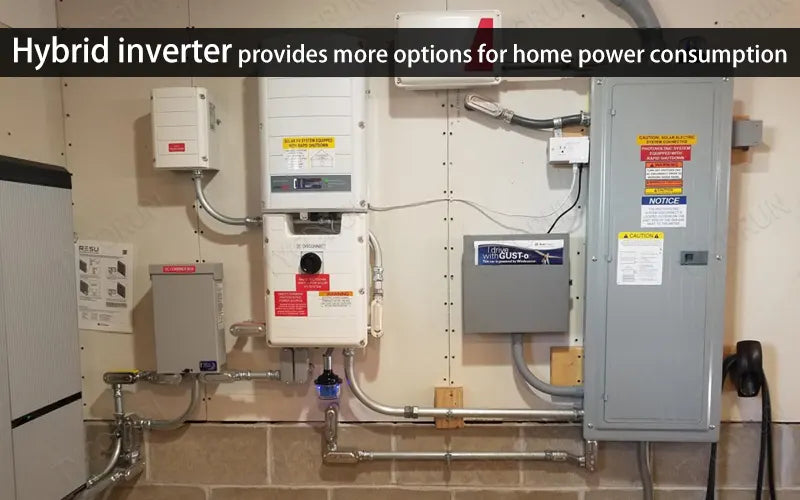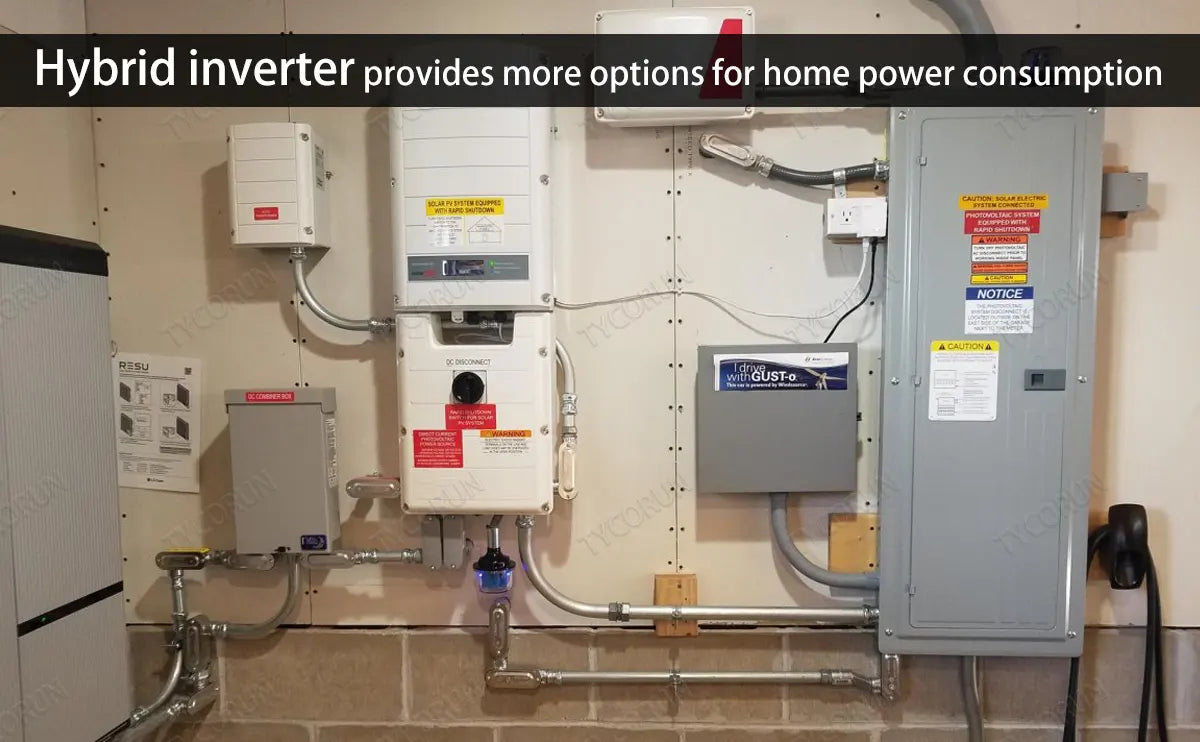
Main content:
In this article, you will learn all about hybrid inverter, including the features of hybrid solar inverters, the options offered by hybrid grid-connected inverters for home solar, how hybrid inverters compare to other types of inverters, and more.
Hybrid inverters are a new solar technology that combines the benefits of traditional solar inverters with the flexibility of energy storage inverters in a single device. For home energy storage owners who want to install solar systems, hybrid inverters are an upcoming solution.
There is room for future upgrades, including an energy storage system. Hybrid inverter can be understood as a new type of inverter that integrates the functions of grid-connected, off-grid and energy storage three types of inverters.
1. What is a solar hybrid inverter
Hybrid inverters combine solar inverters and energy storage inverters into a single device that can simultaneously intelligently manage the grid connection of solar photovoltaic panels, solar cells and utility grids.
Conventional inverters connected to the solar grid convert the direct current generated by photovoltaic panels into alternating current to power your home, while allowing excess electricity to be transferred to the utility grid.
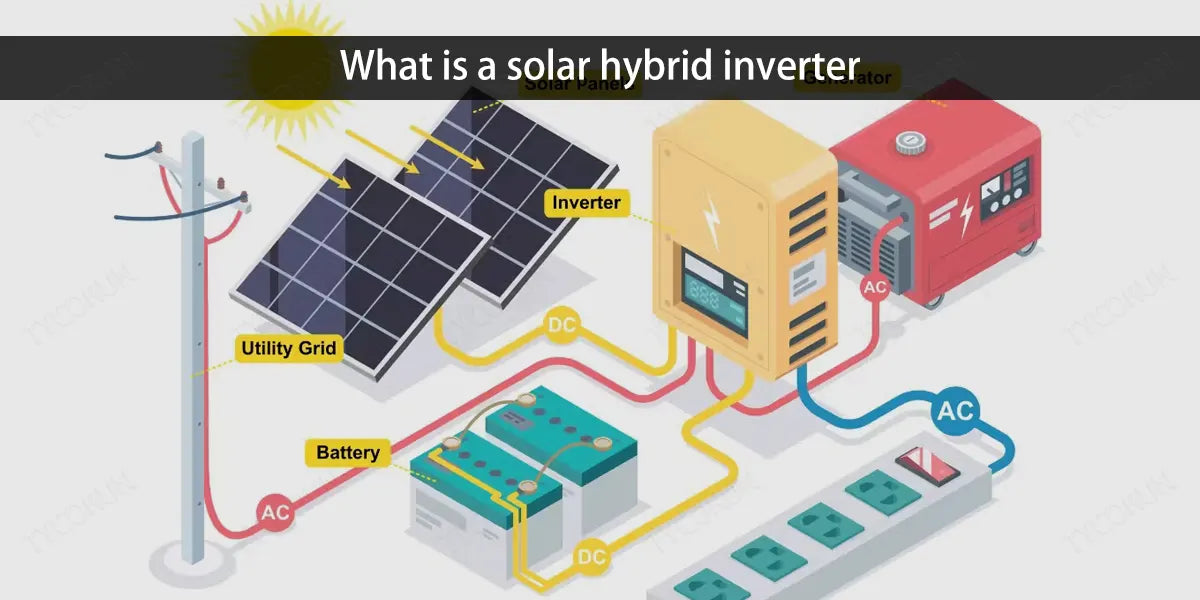
The energy storage inverter can store the direct current generated by the photovoltaic panel in the battery and convert it to 220 volts for daily use in the family when needed. A hybrid inverter is a device that integrates energy storage, current and voltage conversion, and excess electricity into the grid.
The device could still be improved. When the weather is bad and high efficiency solar panels are not enough, power can be extracted from the grid and stored in batteries. In some parts of China, the price of electricity varies during the day and night, or during a certain period of peak electricity consumption.
The electricity in the battery is incorporated into the grid during peak power consumption, and the battery is stored during low peak power consumption, which can help households using photovoltaic power generation systems save electricity bills and even make money.
2. What is the function of the hybrid inverter
The basic purpose of the inverter is to convert the DC input of the solar photovoltaic panel into an AC output that can be used by the home. The use of hybrid solar inverters takes this process to the next level, including the following features:
- Dc and AC two-way power conversion
Usually, the direct current received by the photovoltaic panel (DC coupling) or the direct current converted from the alternating current of the grid charges the battery. During peak grid consumption, the lithium battery power is released, and the inverter needs to convert the stored direct current back to alternating current to be incorporated into the grid.
Hybrid inverter can play both inverter and storage energy roles at the same time. Hybrid grid-connected inverters convert direct current to alternating current to power your home. It can also extract alternating current from the grid and convert it into direct current, which can be stored in energy storage for later use.
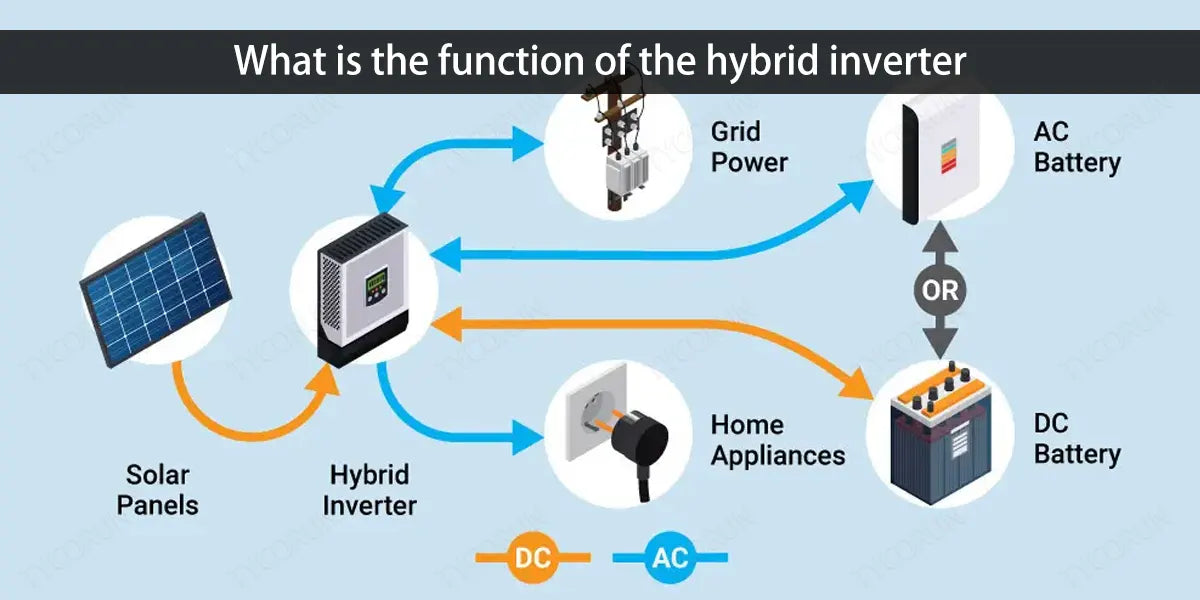
- Power regulation
Depending on the time of day and weather patterns, solar power fluctuates as sunlight levels increase and decrease. The hybrid inverter regulates this power to ensure that the entire system operates within the desired parameters.
- Power monitoring
Solar hybrid grid-connected inverters can be installed with solar power monitoring software that measures and monitors the PV system through a display or connected smartphone app to help identify any faults.
- Power maximization
A hybrid inverter with a Maximum Power Point Tracker (MPPT) checks your solar output and correlates it to the energy storing voltage. This makes it possible to achieve the best power output and convert the direct current into the optimal voltage for the maximum charge of storage energy.
MPPT guarantees that your solar system will work effectively under a variety of conditions, such as different amounts of solar energy, solar energy panel temperatures and electrical loads.
3. How do hybrid inverters compare to other types of inverters
Grid-connected hybrid inverters enable seamless integration between home solar systems and the grid. Once your solar energy storage array generates enough power for your home, you can use excess power to charge your solar energy storage system. The remaining power is then transferred to the grid after the storage accumulator is fully charged.
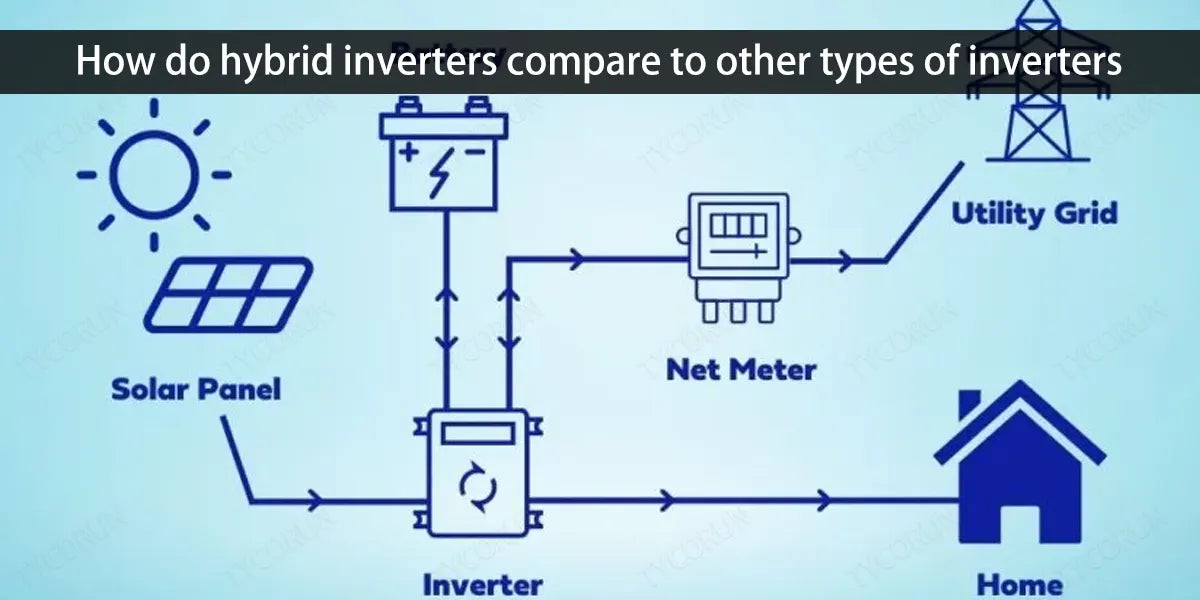
The hybrid inverter stands out from other home central inverters because it has a two-way power transmission capability. As we discussed earlier, energy storage inverters convert between AC and DC power for storage, while grid-connected solar inverters cannot do two-way transmission.
Hybrid inverter can do all of this, if the energy of the solar panel is insufficient, input electricity from the grid to power the home, or charge the solar system. When the energy of the solar panel is sufficient, it can be stored in the battery energy storage system or incorporated into the grid.
3. Advantages and disadvantages of hybrid inverters
Modern hybrid grid-connected inverters like 3000w inverter certainly have some benefits, but there are also some disadvantages that you should be aware of. Here are some of the advantages and disadvantages of a hybrid inverter that you should consider.
① The advantages of a hybrid inverter
- Power elasticity
Having a solar power system doesn't always guarantee you power in the event of a power outage. If your system uses a traditional inverter connected to the solar grid, it will still automatically cut off the power to the solar power generation system during a power outage for safety reasons.
For this situation, a hybrid inverter paired with a solar system is a good solution. It ensures you have both off-grid, on-grid, and energy storage, so you can always get power, even during power outages.
- Easily retrofit energy storage systems
A complete solar installation can be a significant investment, especially if you add an energy storage system on top of other separate components. Hybrid solar inverters are designed to store anytime, allowing you to forgo the cost of installing energy storage from the start. At the same time, you can also more easily add energy storing groups and enjoy the full benefits of solar energy.
- Simplified energy monitoring
Hybrid inverters simplify energy monitoring because you can check important data such as performance and energy production through the inverter panel or connected smart devices. If your system has two inverters, you must monitor them separately.
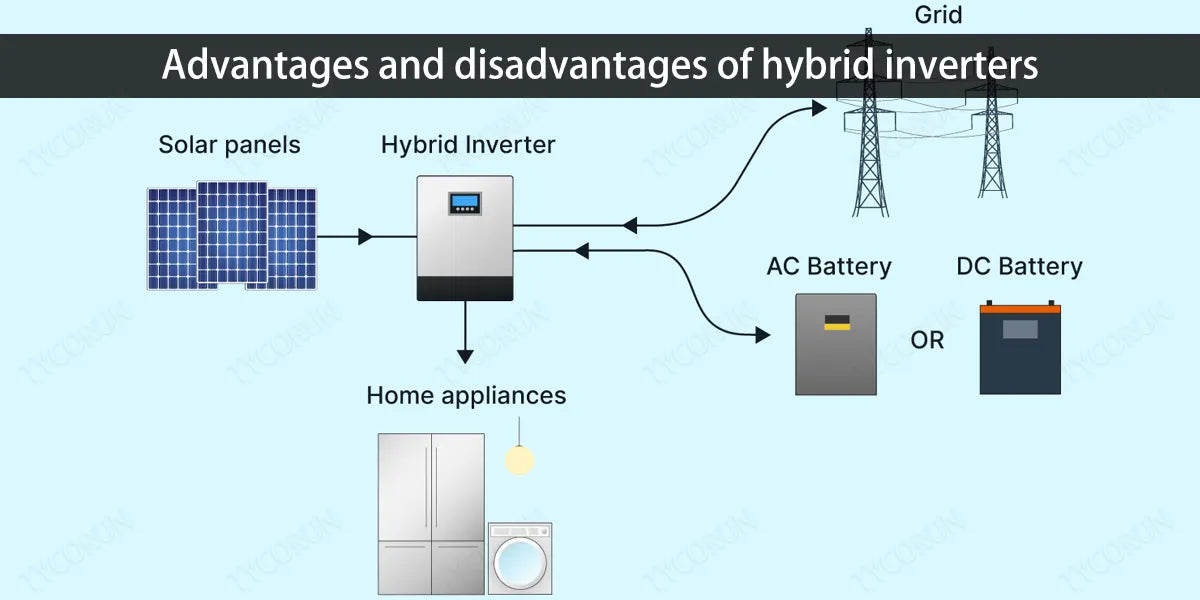
② The disadvantages of hybrid inverter
- Not suitable for upgrading existing systems
If you want to upgrade your existing solar system to include energy storage, choosing a hybrid inverter may complicate the situation, while an energy storage inverter may be more cost-effective.
All you really need is an AC coupled energy storage with an energy storage inverter to scale your system. Since you already have a grid-connected solar inverter, choosing to install a hybrid inverter requires a complete and expensive rework of the entire solar panel system.
- Increased equipment costs
The initial installation of a hybrid inverter can be more expensive than a conventional solar inverter. If power outages are frequent in your area and you want to add backup storage in the future, having a hybrid inverter may be worth the higher cost.
However, if your grid is reliable and you can use net metering, a regular grid-connected system may be sufficient and may be cheaper than a hybrid inverter plus energy storage.
- Reduced future design flexibility
The design of solar energy storage changes as technology advances, and not all hybrid inverters are suitable for every type of storage. If you install a hybrid inverter now and think you might add solar energy storing later, your future options may be limited by compatibility issues.
For example, some solar panel energy storage systems are now equipped with built-in inverters that do not require a separate hybrid inverter at all.
4. Should you buy a hybrid solar inverter
While hybrid solar inverters do require a larger initial investment, the extra cost may be worth it if you plan to include solar energy storage in your initial solar installation or soon after.
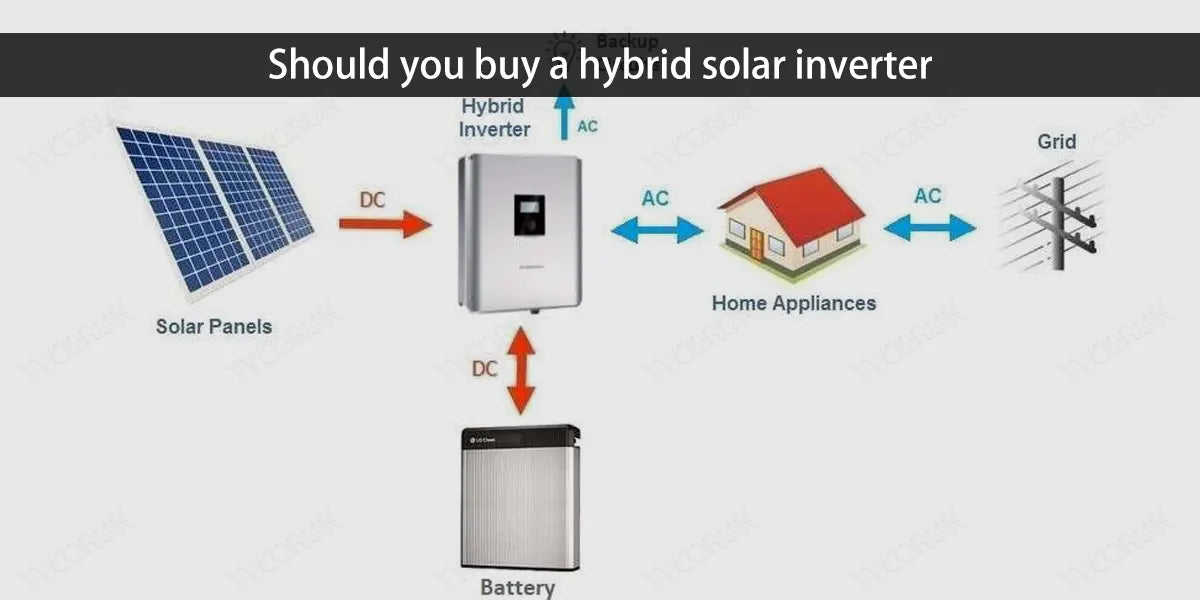
Hybrid inverter helps eliminate problems such as intermittent sunlight and unreliable utility grids, so they perform particularly well compared to other types of
power inverter 2000.
Even better, hybrid inverter can help you store energy more efficiently for future use, including using backup power during outages or peak times. Hybrid inverters also enable more efficient generation and management, especially when it comes to relationships with the broader grid through net metering and usage time rates.
In addition, the MPPT controller enables you to easily monitor and manage your solar system from anywhere through a connected smartphone application. Even if the initial cost is higher, hybrid inverters can maximize the operating efficiency of your PV system in the long run by providing you with a solar inverter.
Hybrid inverters can help you reduce your dependence on the grid, lower your carbon emissions, enjoy advanced monitoring tools, and increase power generation.
5. Conclusion
If you're ready to learn more about inverter technology and the right solar system for your home, start your free solar savings estimate today, then contact a solar expert at Hongguang New Energy, Hubei, who can walk you through the various options for powering your home.
If you want to want more information about Tycorun inverters, please check our power inverter 3000w pure sine wave, power inverter 2000w, 1000w pure sine wave power inverter, price of 500 watt inverter.
Related articles: off grid solar batteries, best chinese solar inverter, Top 5 home energy storage companies


